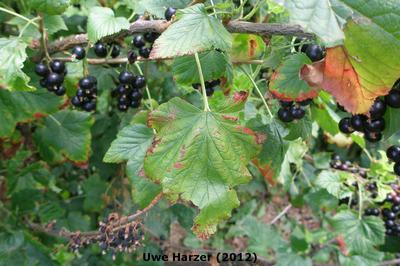Anthracnose of Currant and Gooseberry
Drepanopeziza ribis
Fungus
In a Nutshell
- Dark spots on the leaves.
- Leaf margins roll up and wither.
- Defoliated plant in midsummer.
Can also be found in
Symptoms
Dark, dot-like spots appear on the leaves. Later the spots grow into each other and spread more or less over the whole leaf. The leaf margins roll up and wither. Infected leaves fall off at abnormal stages, and bushes are defoliated to a large extent in midsummer.
Recommendations

Organic Control
When you notice first spots, cut the affected leaves.

Chemical Control
Always consider an integrated approach with preventive measures together with biological treatments if available. Fungicides of the strobilurins family, or those based on copper, fluazinam, pyraclostrobin or cyprodinil and fludioxonil can be applied.
What caused it?
Anthracnose is caused by a fungus that hibernates on fallen leaves. In spring, spores grow on the old leaves and are carried by the wind to the young leaves, where they cause a new infection. In humid climates, the fungus forms new spores on the infected leaves. These help to spread the fungal spores and with them, the disease.
Preventive Measures
- Remove infected leaves before spring.
- Prune the bushes for good ventilation.
- Mulching is highly recommended.
- Apply fertiliser to strengthen plants.
- Plant resilient varieties like the “Rovada” currant, and the “Invicta”, “Mucurines”, or “Reflamba” gooseberry.


